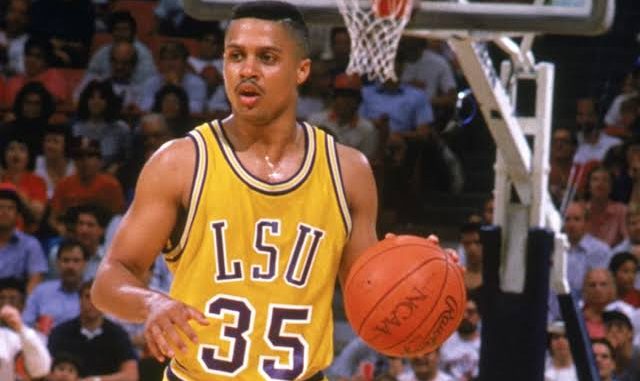The Shooter Returns: LSU Welcomes Back Legend Mahmoud Abdul-Rauf as Director for Player Development
In a move that has excited fans, alumni, and players alike, Louisiana State University (LSU) has announced the return of one of its most storied basketball legends, Mahmoud Abdul-Rauf, as the Director for Player Development. The announcement marks a significant chapter not only in LSU basketball history but in the evolving legacy of a player who has continued to inspire long after his professional career ended. Known for his electric scoring ability, precision shooting, and unshakable principles, Abdul-Rauf’s return to the program that catapulted him to national stardom is both symbolic and strategic.
Mahmoud Abdul-Rauf, formerly known as Chris Jackson, remains one of the most captivating players to ever wear the purple and gold. During his time at LSU from 1988 to 1990, he lit up the college basketball world with his uncanny ability to score at will. He averaged over 29 points per game as a freshman—a record that still stands—and followed it up with another dominant sophomore season. His shooting mechanics, quick release, and movement without the ball made him a nightmare for defenders. But more than that, it was his poise and confidence that distinguished him in an era brimming with talent.
Now, decades later, Abdul-Rauf returns not as a player, but as a mentor. His new role as Director for Player Development places him in a key position to influence the next generation of LSU athletes, both on and off the court. For current players, having a legend like Abdul-Rauf around isn’t just motivational—it’s transformative. His wealth of experience, both in college and in the NBA, offers invaluable insight into the dedication, discipline, and mindset required to succeed at the highest levels.
This appointment also signals a deeper commitment from LSU to integrate its storied history with its future ambitions. By bringing back Abdul-Rauf, the program acknowledges not just his talent, but his journey—a narrative marked by brilliance, struggle, resilience, and integrity. His career in the NBA, particularly with the Denver Nuggets, showcased his unique skills, but his principled stand during the national anthem controversy in the mid-1990s brought him global attention. His refusal to stand for the anthem as a form of protest against what he viewed as systemic injustices made him a polarizing figure. It also led to suspensions, fines, and ultimately a shortened NBA career. Yet, he never wavered in his convictions.
In today’s climate, where athlete activism is more visible and accepted, Abdul-Rauf’s story resonates more than ever. He is now viewed by many as a pioneer who stood for his beliefs long before it became commonplace. For young players navigating not just the pressures of performance but the weight of identity and voice, Abdul-Rauf serves as a living example of how to walk the difficult path of integrity. His presence at LSU is likely to offer mentorship that goes far beyond the arc or the paint.
From a basketball perspective, there are few better to teach the nuances of the game. Abdul-Rauf’s mechanics are still studied by shooting coaches and aspiring guards. His footwork, off-ball movement, and mental preparation are legendary. For LSU players, especially guards and perimeter shooters, access to such detailed mentorship is a gift. He brings with him the kind of knowledge that only comes from having lived the game at the highest level and under the most intense scrutiny.
Yet, what might be most impactful is Abdul-Rauf’s ability to connect through empathy. He has experienced triumph and loss, success and exile. He’s played in the NBA, but also overseas in Turkey, Italy, Russia, and Japan. He’s endured injuries, criticism, and public controversy, but has come through with grace and clarity. He understands what it means to be doubted and misunderstood. For young men transitioning into adulthood under the bright lights of college sports, that kind of guidance is invaluable.
LSU head coach Matt McMahon called Abdul-Rauf’s return a “game-changer,” and rightly so. Bringing back someone who not only understands LSU’s culture but helped define it adds a level of authenticity and credibility to the program. McMahon emphasized the importance of holistic development for players—something Abdul-Rauf embodies. “We’re not just building basketball players; we’re building men,” McMahon said. “Mahmoud understands that better than anyone. His story is one of talent, but more importantly, of character.”
For fans of LSU and basketball purists, the return of Abdul-Rauf is also deeply emotional. He’s a reminder of a time when the Pete Maravich Assembly Center would erupt with every crossover and deep jumper. He’s a link between the past and the present, between nostalgia and possibility. In an age where college athletics often feel transactional, filled with NIL deals and transfer portals, Abdul-Rauf’s return injects a sense of heart and soul back into the program.
Moreover, his journey is a testament to redemption and the long arc of justice. For years, Abdul-Rauf was viewed through the lens of controversy. Now, he is being celebrated for his courage and foresight. Documentaries, books, and interviews have shed new light on the personal and political dimensions of his career. He has become a sought-after speaker and thought leader, addressing issues ranging from race and religion to mindfulness and mental toughness. That breadth of experience is now at LSU’s fingertips.
It’s also worth noting that Abdul-Rauf’s return comes at a time when college basketball is undergoing profound changes. The role of player development is evolving rapidly. It’s no longer just about strength training or shooting drills; it’s about psychological support, leadership training, and life skills. Schools are investing heavily in creating environments that prepare athletes for both professional sports and life beyond. In this context, Abdul-Rauf is perfectly positioned to lead. He represents not just basketball excellence but holistic development.
His personal practices—like meditation, dietary discipline, and spiritual commitment—are already intriguing some players. Abdul-Rauf has spoken openly about how his faith and routine helped him manage his Tourette’s syndrome, a condition that could have derailed his career but instead seemed to sharpen his focus. Teaching young athletes about resilience, self-awareness, and mental preparation is as critical as teaching them how to shoot or pass. In this sense, LSU may be pioneering a more evolved model of player development, with Abdul-Rauf as the cornerstone.
Of course, there will be challenges. Transitioning from player and activist to mentor and administrator requires adaptation. But if there’s one thing Abdul-Rauf has proven time and again, it’s his ability to evolve while staying true to his core. He enters this role not as a relic of past glory, but as a living embodiment of growth. And the players he’ll work with won’t just be learning how to play—they’ll be learning how to live.
The buzz around his return is already rippling through Baton Rouge. Alumni are energized, recruits are intrigued, and current players are eager to learn. There is a sense that something meaningful is happening—not just a hiring, but a homecoming. Abdul-Rauf’s story has come full circle, and LSU is the richer for it.
In the end, the appointment of Mahmoud Abdul-Rauf as LSU’s Director for Player Development is more than a personnel move. It’s a cultural moment. It’s a recognition of history, a nod to integrity, and a bold step toward the future. The shooter is back—not to light up the scoreboard, but to ignite minds and spirits. And if his past is any indication, he’s about to make just as much of an impact in this next chapter as he did in his first.



